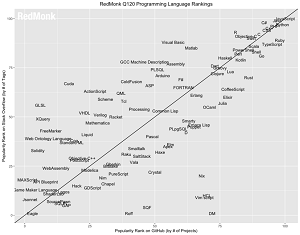News
TypeScript Keeps Climbing Popularity Ladder
After making waves by cracking the top 10 of the RedMonk Programming Language Ranking last year, TypeScript has continued its climb in the latest bi-annual report that analyzes GitHub and Stack Overflow data in order to weigh coding and discussion traction.
By notching 10th place in June 2019, the Microsoft-created JavaScript variant was the first language to crack the top 10 in five years, save a previous one-quarter visit by Swift. RedMonk's Stephen O'Grady questioned whether TypeScript would maintain its position or fade away like Swift did.
"This quarter brings the answer, which was that TypeScript did not sustain its performance, it exceeded it," said O'Grady in a Feb. 28 blog post. "Instead of retreating back to the 10-15 range, the JavaScript-compatible language continued to gain, moving from tenth place to ninth. As with Python, TypeScript is succeeding in part because of patterns. Instead of versatility, however, TypeScript is buoyed by both its ability to intermingle with a large existing codebase in JavaScript and its potential ability to make the resulting code safer. This has proven to be a winning combination, one which raises expectations from whether or not the language belongs in the Top 10 to how much higher -- if at all -- it might go."
Developers are attracted to TypeScript because, as its name implies, it offers the option of adding static typing functionality to JavaScript, among other benefits. Those benefits propelled TypeScript to be named one of the most in-demand programming languages in a software engineering report by careers firm Hired earlier this year. TypeScript placed No. 4 in that ranking, behind Go, Scala and Ruby. Hired's "in-demand" designation is based on the number of interview requests per candidate on the Hired platform in 2019.
Other climbers in the new RedMonk ranking include Dart, moving up three spots, R, moving up two, and Kotlin, Groovy, Go and Python moving up one. The full RedMonk plot looks like this:
 [Click on image for larger view.] RedMonk Q120 Programming Language Rankings (source: RedMonk).
[Click on image for larger view.] RedMonk Q120 Programming Language Rankings (source: RedMonk).
Including ties, that makes the top 20 look like this:
1 JavaScript
2 Python
2 Java
4 PHP
5 C#
6 C++
7 Ruby
7 CSS
9 TypeScript
9 C
11 Swift
12 Objective-C
13 Scala
13 R
15 Go
15 Shell
17 PowerShell
18 Perl
19 Kotlin
20 Haskell
Commenting on the overall results, O'Grady said, "Generally when these rankings are prepared, there is little to comment on with regard to movement in the Top 10 entries. Because both the X and Y axis reflect metrics that are accretive in nature, the higher the language is ranked the more difficult it becomes to displace. It is notable, therefore, that we have movement amongst four languages. Two will be discussed in more detail below, but the drop of C++ (6) by one spot is overshadowed by the rise of Ruby from #8 to #7. By itself, this gain would be of relatively little consequence, but as was said two years ago in this space, quantitatively Ruby appeared to have peaked and had been in a period of stagnancy and, arguably, decline. One quarter’s performance does not, of course, reverse this analysis or trajectory overnight, but it is certainly a bright spot for advocates of the language."
The RedMonk ranking is intended to correlate language discussion and usage in order to provide insights about potential future adoption trends, as opposed to offering a statistically valid representation of current usage.
About the Author
David Ramel is an editor and writer at Converge 360.